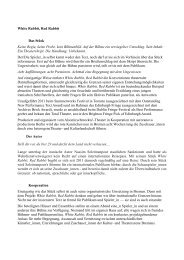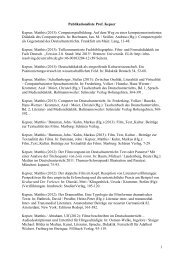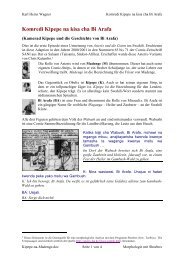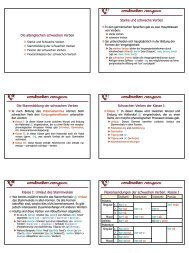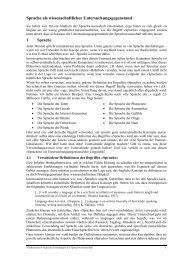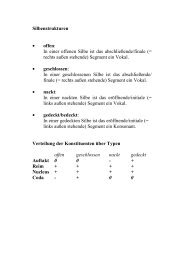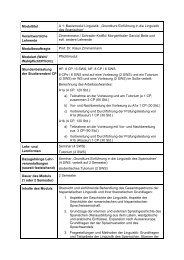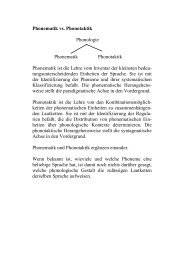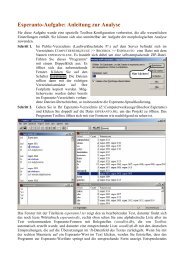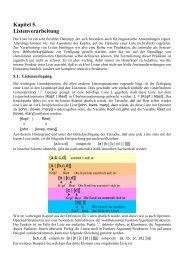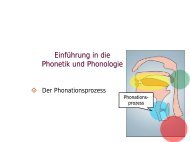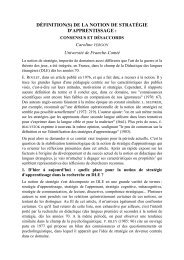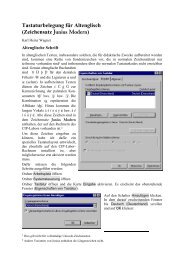Relativism and Universalism in Linguistics - Fachbereich 10 ...
Relativism and Universalism in Linguistics - Fachbereich 10 ...
Relativism and Universalism in Linguistics - Fachbereich 10 ...
Create successful ePaper yourself
Turn your PDF publications into a flip-book with our unique Google optimized e-Paper software.
122 Sections<br />
among <strong>in</strong>dividuals with a common <strong>in</strong>terest” (Oxford English Dictionary) or “…a reciprocal<br />
relationship characterized by similarities that make for like-m<strong>in</strong>dedness or similar behaviour<br />
dispositions (Brown & Gilman 1978, Picker<strong>in</strong>g 1990, Wouk 2001).<br />
This paper concentrates on how SPEAKER SOLIDARITY is expressed <strong>in</strong> Spanish <strong>and</strong> English<br />
oral discourse, s<strong>in</strong>ce it is this type of SOLIDARITY that has been less studied by discourse<br />
analysis <strong>and</strong> pragmatics. That is, we study the various l<strong>in</strong>guistic means -discourse markers,<br />
lexis, grammar, <strong>in</strong>tonation, repetition, silence, etc.-, speakers use <strong>in</strong> order to build a solidary<br />
relationship with hearer <strong>and</strong> secure a solidary response from him/her.<br />
Because of the wide variety of forms, their multi-functionality <strong>and</strong> because of the fact that<br />
they are so difficult to translate, an onomasiological approach to the expression of<br />
SOLIDARITY <strong>in</strong> English <strong>and</strong> Spanish has been undertaken <strong>in</strong> the analysis under study. That is,<br />
we follow a comprehensive approach <strong>in</strong> which we trace down all the forms <strong>and</strong> functions<br />
manifested <strong>in</strong> English <strong>and</strong> Spanish oral discourse related with the semantic field of<br />
SOLIDARITY, rather than concentrat<strong>in</strong>g on concrete marker.<br />
The sources for our analysis are Spanish <strong>and</strong> English radio programmes <strong>in</strong> which people<br />
speak about their most <strong>in</strong>timate worries or problems. Programmes <strong>in</strong> which speakers feel free<br />
to talk about their worries <strong>in</strong> a natural, anonymous situation/sett<strong>in</strong>g <strong>and</strong> therefore conta<strong>in</strong><br />
spontaneous oral discourse (Spanish: Hablar por hablar, No es un día cualquiera, Géneros<br />
nocturnes <strong>and</strong> English: Late night love <strong>and</strong> Sunday Surgery.<br />
By exam<strong>in</strong><strong>in</strong>g, then, the conceptual doma<strong>in</strong> of SPEAKER SOLIDARITY <strong>in</strong> English <strong>and</strong> Spanish<br />
<strong>and</strong> by expla<strong>in</strong><strong>in</strong>g how it is realized <strong>in</strong> each language (that is, the different sources, their<br />
development, frequency of usage <strong>and</strong> functions of markers), we show that the qualitative <strong>and</strong><br />
quantitative differences between both languages are based on different cultural values which<br />
lead to differences <strong>in</strong> conversational style <strong>and</strong>, <strong>in</strong> the end, can enhance both the translation<br />
<strong>and</strong> the acquisition of pragmatic markers with<strong>in</strong> a cross-l<strong>in</strong>guistic framework.



